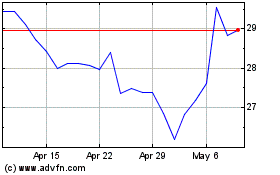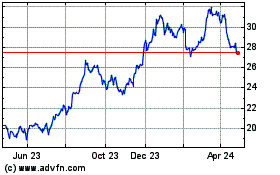Julius Baer Assets Lifted by Brexit Trading Boost
July 25 2016 - 11:06AM
Dow Jones News
ZURICH—Swiss bank Julius Baer Group AG said it increased assets
it manages for clients in the first half of this year, as it bulked
up on staff and its overall results were bolstered by the U.K.'s
vote to leave the European Union.
The bank's report Monday managed to offset a relatively gloomy
outlook for the near future issued by its chief executive.
Zurich-based Julius Baer said adjusted net profit rose 5% in the
first half compared with the first six months of 2015, as assets
under management rose 4% from the end of last year to reach 311
billion Swiss francs ($314.9 billion).
Shares of Julius Baer were recently up 4.4%.
The bank said its underlying net trading income fell compared
with the first half of last year, when volatility had risen sharply
due to the Swiss central bank's surprise decision to remove a cap
on the value of the franc. But the figure jumped 26% compared with
the second half of last year, Julius Baer said, as trading volumes
in foreign currency spiked in relation to another dramatic event in
June: the U.K.'s vote to leave the EU.
The Brexit vote "has been a good, broad-based event when it
comes to transaction income," Chief Executive Boris Collardi said
at a media briefing. In a subsequent interview, Mr. Collardi said
the bank continues to benefit from the vote's aftermath, and hopes
to continue seeing clients take up related trading positions "as
long as we can."
Julius Baer is narrowly focused on the business of private
banking for wealthy clients, in which it strives to compete with
bigger, more diversified Swiss players UBS Group AG and Credit
Suisse Group AG. All three wealth managers have been challenged
recently by turbulent markets, which have pushed cautious clients
to let their assets remain dormant—and in turn, starve the banks of
fees.
Julius Baer said net commission and fee income slipped 7% in the
first half of 2016 compared with the same period last year, because
of "reduced client risk appetite." Meanwhile, weakened currencies
cut 4 billion francs from the value of its assets under
management.
Also, like its Swiss peers, Julius Baer is increasingly burdened
by the negative interest rate policy implemented by the country's
central bank. That policy means that lenders keeping cash at the
central bank are being charged 0.75% on deposits above a certain
level. In Julius Baer's case, Mr. Collardi said, those charges
amounted to 20 million francs in the first half of the year.
Mr. Collardi painted a daunting picture for his industry's
near-term future.
He said market volatility should continue this year because of
political events such as the U.S. presidential election. Central
banks, meanwhile, have likely exhausted their ability to ease
troubled markets with further interest rate cuts: "This ongoing
race to the bottom in terms of interest rates has probably now
reached its max impact," the CEO said.
Yet, Julius Baer's investments point to a more upbeat
longer-term outlook.
The bank said it saw a 3.7% gain in net new money to manage in
the first half. That increase came alongside growth in banking
staff. About 50 new relationship managers joined the bank in the
first half of this year, compared with 40 hired in all of last
year. Julius Baer has more than doubled its number of relationship
managers since 2008, to nearly 1,300, amid a series of
acquisitions.
Recent difficulties encountered by Credit Suisse, which is in
the midst of a fitful restructuring effort and has seen its stock
price fall sharply, haven't created opportunities for Julius Baer
to hire Credit Suisse bankers, Mr. Collardi said. "We're not seeing
anything different now than in the past," he said. A veteran of
Credit Suisse who left in 2006, Mr. Collardi said, "I regret to
see" the bank in its current predicament, having embarked on a
turnaround bid last year just as markets were becoming more
challenging. Still, he added, "one has to make his own luck."
Julius Baer's expansion in the first half of the year helped to
offset unwelcome developments in the period, including
"deleveraging" among clients in Asia, or a decline in loans to
clients in that key region secured by assets held at the bank.
The result also comes as Julius Baer said it has now "completed"
the process of European clients pulling assets out as they declare
their Swiss bank accounts to tax authorities in their home
countries—which has long been a drag on Julius Baer's business.
Adjusted net profit was 402 million francs in the first half, a
5% increase from the same period in 2015, when excluding a
provision of $350 million the bank made in the first half of last
year to help it settle a longstanding U.S. Justice Department probe
of its aiding of tax evasion among American clients.
Julius Baer later admitted to helping American clients evade
taxes, and settled the matter by agreeing to pay $547 million.
Write to John Letzing at john.letzing@wsj.com
(END) Dow Jones Newswires
July 25, 2016 10:51 ET (14:51 GMT)
Copyright (c) 2016 Dow Jones & Company, Inc.
UBS (NYSE:UBS)
Historical Stock Chart
From Mar 2024 to Apr 2024

UBS (NYSE:UBS)
Historical Stock Chart
From Apr 2023 to Apr 2024
